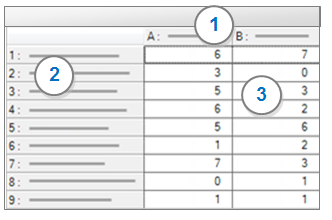About node matrices
When you run a Matrix Coding query, the results are displayed in a node matrix. This topic describes node matrices and provides information about how to work with them.
You need NVivo for Mac 10.1 or later to work with node matrices.
In this topic
- Understand node matrices
- How are node matrices created?
- Open and navigate node matrices
- What can I do in a node matrix?
Understand node matrices
Node matrices provide a way to cross-tabulate the coded content in your project.
For example, a node matrix can be used to cross-tabulate the attitudes of interview participants to the services offered by their local council. Each cell in the matrix represents a node containing the content coded at the intersection of the row and column.

1 Columns—contains the items you select to display in columns—for example, positive, neutral, and negative.
2 Rows—contains the items you select to display in rows—for example, libraries, parks, public health, and recycling.
3 Cells—this can include the number of coding references at the intersection of a row and column—for example How many negative comments were made about public health? You can change the cell content—for example, to display number of sources or nodes coded.
How are node matrices created?
Node matrices are created when you run a matrix coding query. With matrix coding queries, you can ask a wide range of questions about patterns in the data and gain access to the content that shows those patterns.
For example, you could create a matrix coding query to compare the attitudes (positive, neutral and negative), of interview participants to a range of services offered by their local council. Each cell in the matrix represents a node containing the content coded at the intersection of the row and column.
Open and navigate node matrices
When you run a matrix coding query, you can choose to store the results in either the Node Matrices folder (as a node matrix) or the Results folder (as a results node matrix). You open and navigate node matrices in the same way, no matter where you choose to store them. Refer to Manage query results for more information on storing query results.
You can double-click a node matrix in List View to open it in Detail View.
You can expand the column widths or use the scroll bars. You can double-click on a cell in the matrix to open the node containing the content coded at the intersection of the row and column nodes.
You can expand the column widths or use the scroll bars—refer to Filter, sort and customize node matrices for more information. You can double-click on a cell in the matrix to view the content coded at the intersection of the row and column nodes.
What can I do in a node matrix?
When working with a node matrix you can:
-
Open a node from a matrix cell to see all the content coded at the cell (at both the row and column nodes)
-
Apply shading to cells to make it easier to see patterns in the matrix
-
Change the information displayed in the matrix cells—for example number of sources coded or number of nodes coded


